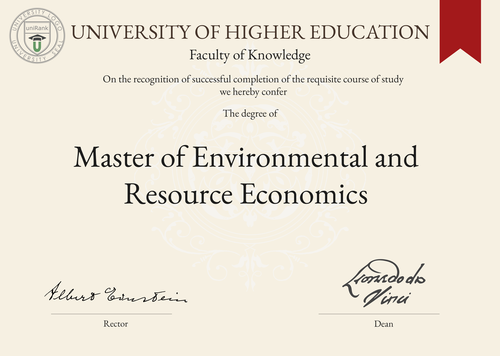
Master of Environmental and Resource Economics (MERE)
Guide to Master of Environmental and Resource Economics Program/Course/Degree
Master of Environmental and Resource Economics (MERE)

Degree Name:
Master of Environmental and Resource Economics
Degree Abbreviation:
MERE
Duration Range:
1-2 years
Tuition Range (US, UK, AUS, NZ):
$10,000-$50,000 per year
Overview:
The Master of Environmental and Resource Economics degree is designed to provide students with a comprehensive understanding of the economic principles and tools necessary to analyze and manage environmental and natural resource issues. This degree program is ideal for students who are interested in pursuing careers in environmental policy, natural resource management, or sustainable development.
Curriculum Overview by Year:
- First Year: Microeconomic Theory, Econometrics, Environmental Economics, Natural Resource Economics, Elective Courses
- Second Year: Advanced Environmental Economics, Advanced Natural Resource Economics, Elective Courses, Research Project or Thesis
Key Components:
- Microeconomic Theory
- Econometrics
- Environmental Economics
- Natural Resource Economics
- Advanced Environmental Economics
- Advanced Natural Resource Economics
- Elective Courses
- Research Project or Thesis
Career Prospects:
Graduates of the Master of Environmental and Resource Economics degree program are well-equipped to pursue careers in a variety of fields, including:
- Environmental Policy
- Natural Resource Management
- Sustainable Development
- Energy and Climate Change
- Consulting
- Academia
Salary Expectations:
The salary expectations for graduates of the Master of Environmental and Resource Economics degree program vary depending on the chosen career path and location. However, graduates can expect to earn a median salary of $70,000-$100,000 per year.
For a more accurate understanding of salary expectations, you can utilize the Job Sites Search Engine, from our sister site jobRank, which searches over 4,600 job sites worldwide. Make sure to specify not only the job title but also the country you are interested in.Conclusions:
The Master of Environmental and Resource Economics degree program is an excellent choice for students who are interested in pursuing careers in environmental policy, natural resource management, or sustainable development. However, it is important to note that the duration, tuition fees, curriculum, key components, career prospects and salary expectations can vary depending on the chosen country and university where to study this degree. Visitors can search where this specific degree (MERE) is offered anywhere in the world through the uniRank World Universities Search Engine.
World Universities Search Engine
search for Master of Environmental and Resource Economics (MERE) and add the Location (country, state etc.) or specific University you are interested in studying at.
Query examples:
- Master of Environmental and Resource Economics (MERE) United States
- Master of Environmental and Resource Economics (MERE) United Kingdom online
- Master of Environmental and Resource Economics (MERE) Australia international students
- Master of Environmental and Resource Economics (MERE) University of California
- Master of Environmental and Resource Economics (MERE) University of London tuition fees
- Master of Environmental and Resource Economics (MERE) University of Sydney scholarships
Share Program/Course
Interesting? Share this program/course/degree info with your friends now.